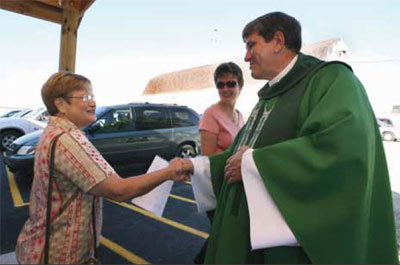July 20, 2008

‘Have Roman collar – will travel’ for the Lord

Father John Jamnicky, founding pastor of St. Raphael Church, located on a former
farm in rural Antioch, greets parishioners.Catholic New World/Karen Callaway
He is: Father John A. Jamnicky, founding pastor of newest parish in the archdiocese, St. Raphael the Archangel in Antioch. Attended St. Francis de Sales Grade School on the Southeast Side and Quigley North and South seminaries. Has a bachelor’s in philosophy and a masters in divinity from University of St. Mary of the Lake. Ordained 1972.
Growing up: He and his younger sister, Margaret Mary, walked a mile to grade school. At Quigley he was in wrestling and basketball. “I’ve always enjoyed hiking, camping and fishing. My father was that way. I’ve hunted and fished all my life and always found God in the wilderness.” He had an uncle who was a dairy farmer in Wisconsin, so he feels at home on a farm, too.
Work and seminary: “Our old home was near the mills.” Dad was a loading foreman at Wisconsin Steel for 47 years. “I had quite a few jobs at Republic and Wisconsin Steel, before and during Niles Seminary.”
Urban and rural experiences: He was given a year away from Mundelein for a course in clinical pastoral education. “In 1969 I did a three-month chaplaincy at San Quentin near San Francisco and lived right in the prison.” He spent a summer with Glenmary priests in Georgia through the Catholic Extension Society, and “learned about race and prejudice in the 1960s South.”
Double promoted: He was happy to be assigned to St. Martin’s, an African-American parish on Chicago’s South Side after ordination. With the death of the pastor within his first nine months, he suddenly became — “the youngest pastor in the archdiocese.” After 10 years, Cardinal Cody named him chaplain of O’Hare Airport Chapel.
Airport Chapel? “I didn’t know there was a chapel at O’Hare.” For the next 20 years he brought it to life. He counseled families after disasters, celebrated Mass for airport personnel, travelers and even appeared on TV’s “20/20.” “I worked within three bureaucracies: the U.S. government [Air National Guard at O’Hare], City of Chicago [O’Hare belongs to the city] and the church [archdiocese]. But the people themselves weren’t hard to deal with.” He served as chaplain to the Illinois Air National Guard and U.S. Air Force from 1984-89, with the rank of captain.
Frequent flyer miles: The Catholic bishops named him their first national coordinator for Mobility Apostolates in 2000 and he moved to Washington, D.C. “That means ministering to people on the move. It involves all the airport and maritime ministries, highways, truck stops, shrines along the road, railroads, tourism, national parks, and pilgrimages in the USA.” In becoming national director of the Apostleship of the Sea, he also developed a program on major cruise ship lines that provided 800 priest-chaplains for passengers and crews.
Keeping mission spirit alive: Whether it was spending a sixmonth sabbatical ministering in rugged Alaska in 1998, or founding a parish in rural Lake County, “In the country, with no buildings, no pews, starting with the basics — it’s all mission. You preach the Gospel and try to bring people in. It is extremely exciting.”
What he’s learned at each post: “The Lord has given me some gifts. To be a trailblazer — if there’s no road, cut a path so people can get closer to the Lord. He’ll be my guide and together we’ll get something started.”
Fuel: “The Eucharist — daily Mass is so much a part of my prayer life — it’s vital. Celebrating Mass for the whole community is such a grace-filled experience and important for my own life, too. I’ve always had a spiritual director for guidance, ever since I was a young priest. A Japanese Passionist priest introduced me to the eight-day directed Ignatian retreat. I never fail to go on one yearly to a different place to experience the Lord.” He made a 30-day retreat before going to Alaska. “You have to be continually revolutionizing your spirit by being in the presence of the Lord and nurturing that relationship.” Motto for a religious vocation: “If the Lord calls, don’t refuse. You’ll have the greatest life available, with hard work, happiness and the fulfillment of serving Almighty God.”
 Catholic
New World - Newspaper for the Archdiocese of Chicago
Catholic
New World - Newspaper for the Archdiocese of Chicago Archdiocese of Chicago Directory
Archdiocese of Chicago Directory Oficjalne wydawnictwo Archidiecezji Chicago w języku polskim
Oficjalne wydawnictwo Archidiecezji Chicago w języku polskim